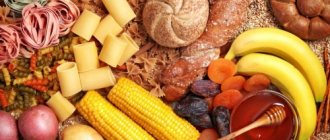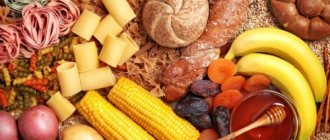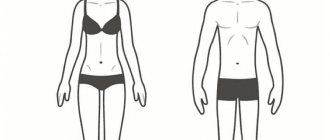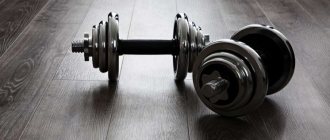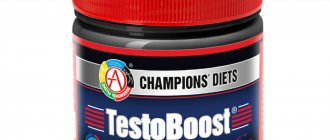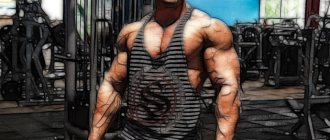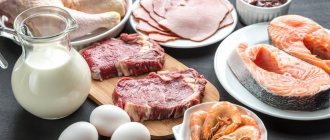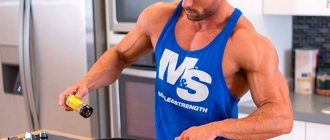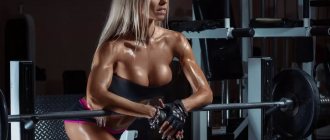Besides training hard, the most important aspect of gaining muscle mass for men and women is nutrition. This article will focus on exactly that.
There is an inaccurate opinion that gaining good muscle mass is only possible by consuming sports nutrition, pure protein, or injecting yourself with steroids - no. More precisely, this will not be enough: such a mass will be maintained with constant consumption of the above. The main component in sports nutrition is protein (a building material for tissues, bones, and joints). But the body still needs antioxidant vitamins and amino acids, which are best obtained from food: natural vegetables, fruits, meat, dairy products, and grains.
Sports nutrition
Nowadays, many stores offer nutrition specifically designed for bodybuilders. It is a mixture of dry proteins, carbohydrates, microelements, vitamins and everything that a bodybuilder needs.
Despite what the manufacturers of such products, the press, advertising and media may claim, there is no need for an amateur bodybuilder to use them constantly. Taking sports nutrition as a “feeding supplement” begins when the bodybuilder can no longer gain muscle mass with regular nutrition. They will make muscles grow.
Sports nutrition is used on an ongoing basis only to solve specific training problems. For example, before a competition, when an athlete is on a strict diet in order to get rid of subcutaneous fat. During this period, he is forced to reduce the consumption of conventional foods to a minimum, while simultaneously carrying out heavy training. This is where mixtures and nutritional supplements come to the rescue, containing everything a bodybuilder needs, except fats.
Healthy foods for muscles
In order to perform certain movements, it is necessary that the muscles responsible for this are provided with a sufficient amount of nutrients. Thanks to proper nutrition, muscles can not only function, but also grow.
The main products necessary for normal muscle functioning include the following:
- Beef. Champion in essential amino acid content. Contains creatine, a protein that increases muscle mass by reducing fat.
- Eggs. Thanks to the lecithin they contain, they are involved in ensuring the coordinated (synchronous) work of muscles and the nervous system. Also, in addition to protein, they contain a lot of vitamin D, which is necessary for the health of muscle tendons.
- Chicken. Just like beef, it participates in the construction of muscle fibers.
- Dairy products. They are an irreplaceable source of organic calcium, which is responsible for the normal conduction of nerve impulses. In addition, they are an excellent remedy for muscle pain.
- Green vegetables (broccoli, asparagus, green beans and lettuce) are sources of magnesium, which is responsible for reducing the stress associated with long-term work.
- Mackerel. Rich in healthy fats, which are especially necessary during muscle work to provide them with energy. In the absence of these fats, the body begins to process itself. If they are present, this process slows down significantly, so that a person will have enough time to get to the place of food without turning into a skeleton covered with skin.
- A pineapple. Thanks to the bromelain enzyme contained in pineapple, the process of transforming eaten proteins into muscle mass will take much less time than without its presence. In addition, it protects muscles from overload.
- Green tea. Increases muscle resistance to stress. Removes lactic acid, reducing muscle pain.
- Turmeric. Responsible for regeneration. Necessary for muscles that may be subject to microtrauma as a result of work.
- Buckwheat. Thanks to the essential amino acids it contains, buckwheat takes pride of place among foods responsible for muscle regeneration.
- Almond. It contains the most easily absorbed form of vitamin E. Thanks to it, almonds help muscles recover faster from muscle injuries.
- Bell pepper (red). It has no equal in vitamin C content. It can easily outperform lemon and blackcurrant. And since this vitamin is an essential component of collagen, the inclusion of this vegetable in the diet is an extremely necessary action.
General recommendations
To ensure productive life, it is advisable to eat fractionally 5-6 times a day. In this case, 70% of food should be eaten in the first half of the day. Only in this case will the muscles perform the function that is intended for them.
With prolonged work, lactic acid accumulates in the muscles. In order to remove it, you need proper rest, green tea, exercise on an exercise bike and a sufficient amount of water.
Folk remedies for normalizing work and cleaning the muscular system
In order for the muscular system to always be in order, it is necessary to take care not only of the supply of beneficial substances to it, but also of the removal of harmful ones.
The following methods are used to cleanse the muscular system:
- Cleansing diet. Melt water is consumed all day. In the evening you need to drink one glass of whey. I don't eat anything all day.
- Cranberry juice. Crush the cranberries and pour boiling water over them. (It is better to select the concentration of berries in the fruit drink individually). Add a little honey or sugar. (Sweeteners are added to neutralize excess acidity of the berry. The drink should have a slightly sweet or neutral taste) Drink several times throughout the day. Cleansing is carried out over three weeks.
- Berries. Berries such as barberry, red currant, dogwood, grapes and chokeberry are useful for cleansing muscles.
- Dandelion. An infusion of dandelion roots has an excellent cleansing effect. Its bitter taste tones the liver, which begins to cope better with cleansing all body systems, including the muscular system. It’s not for nothing that the French grow this plant as a cultivated plant! After soaking in salt water, dandelion leaves are used in salads.
A bath will help get rid of lactic acid from tired muscles. During bath procedures, blood circulation in the muscles improves. Oxygen levels increase. New vessels are formed. The muscles receive new portions of nutrients.
Harmful foods for muscles
- Sugar, jam, tori and other baked goods . When they are consumed, fat accumulation occurs, not muscle mass.
- Fats . Excessive amounts of fatty foods cause calcium blockage.
- Fried foods . Substances contained in fried foods cause irritation of nerve fibers, and as a result, muscle performance decreases.
- Alcohol . Causes calcium blockage. In addition, under the influence of alcohol, degenerative changes in muscle tissue occur.
- Preservatives . They form difficult-to-digest compounds, making them practically useless for muscles.
Attention! The information is for informational purposes only and is not intended to make a diagnosis or prescribe treatment. Always consult a specialized doctor!
Tatyana Eliseeva chief editor of the Food+ project
Ask a Question
Rating:
7.9
/10
Votes: 12
Usefulness of material 7.6
Reliability of information 6.3
Formatting of Article 9.7
Proper nutrition
Any professional bodybuilder will confirm that the difference between amateur and professional bodybuilding is knowledge of nutrition. The importance of nutrition in professional sports is much more complex than it seems at first glance.
For example, an athlete decides to train more intensely. To do this, he needs to increase the proportion of carbohydrates in his diet. An ignorant person will decide that he needs to eat more sweets. But sweet dishes will worsen digestion and protein metabolism will slow down. And in order to build muscle, you need fast protein metabolism. In addition, sweets contain a large amount of fat, and a bodybuilder does not need them at all.
With all this, intense training is completely impossible without increased carbohydrate nutrition. Experienced athletes have long known that not only sweets can be used as a source of carbohydrates. Using their knowledge of nutrition, they select a diet that meets their goals. It also happens that nutrition programs aimed at muscle growth are completely vegetarian. It’s incredible, but it’s a fact that many holders of the Mr. Olympia and Mr. Universe titles have never consumed meat products at all.
The basic rules for eating are as follows:
- Listen to your body. It often happens that a personal eating schedule does not correspond to the generally accepted one. In this case, the bodybuilder will have to be creative and make the diet the way the body requires. For example, some start the day with a hearty breakfast, while others cannot bear food at all in the morning. But even if an athlete finds an optimal nutrition plan for himself, over time the metabolic processes in the body may change. Therefore, you need to constantly listen to your stomach and follow its wishes.
- Don't overeat, even if it seems like your workouts are too hard and take a lot of energy. The body can only absorb a limited amount of protein in one meal. Considering that food is not cheap, overeating can only lead to excrement becoming the most expensive in the area
- Three meals a day are usually not suitable for a bodybuilder. For muscle growth, it is healthier to eat 4-6 times a day. By the way, many nutritionists advise ordinary people to eat according to this scheme.
- Don't try to eat only meat. Even the biggest lovers of meat products sooner or later switch to a vegetable diet. On the other hand, a large amount of vegetables will have a healing effect on the liver and stomach and reduce cholesterol levels in the blood.
- Become a nutrition expert. To do this, it is enough to read several popular books on dietetics and always have a reference book on hand indicating the amount of proteins, fats, carbohydrates and other substances in various products.
Sample diet for a novice bodybuilder
Breakfast:
- 3 egg omelette;
- boiled fish fillet with a side dish (potatoes, buckwheat or rice);
- bread;
- fruit (orange, piece of melon, apple);
- a glass of skim milk.
Lunch:
- nuts, seeds or a slice of cooked meat on a sandwich;
- kefir or yogurt.
Dinner:
- fish, meat or poultry with vegetables;
- green salad;
- fruit;
- a glass of skim milk.
Before training:
- 2-3 different fruits to accumulate energy.
After training:
- meat, fish or poultry with vegetables;
- green salad;
- a glass of skim milk.
Dinner:
- cheese;
- fruit;
- a glass of skim milk.
Persons suffering from milk intolerance can replace it with juice or mineral water.
Milk has a good effect on muscle growth, but you should not drink it by force. There will be no benefit from this. You can optionally add potatoes and various cereals to this diet.
Vitamins and microelements
Scientists have proven that due to the peculiarities of nutrition and life activity of modern man, the vitamins and microelements entering the body with food are not enough, no matter how healthy he eats. Bodybuilders with their hard workouts need much more vitamins than the average person.
Buy a package of vitamins and a package of microelements at the pharmacy and take them according to the instructions. During periods of intense training, the daily dose should be doubled.
